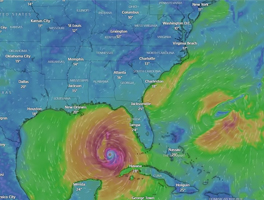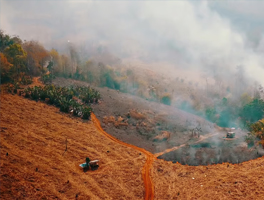 |
Dear readers,
Welcome to the Climate Weekly newsletter by the Centre for Science and Environment’s Climate Change programme and Down to Earth magazine.
Hurricane Milton approached the coastal US state of Florida last week, with an explosive and unexpected rapid intensification from a category 1 (119 km/hr to 153 km/hr) to a category 5 (>253 km/hr) hurricane within 12 hours on October 7 in the Gulf of Mexico. It is a tell-tale sign of much warmer than normal sea surface temperatures, itself an indication of global warming and consequent climate change. The science linking storms and hurricanes to human-driven climate change has been less straightforward than it is for, say, a heatwave. Nevertheless, scientists have clarified that Milton was fuelled in part by record to near record warmth across the Gulf of Mexico – i.e., “the warmer the ocean is, the more fuel there is for hurricanes to intensify, provided other atmospheric conditions (like wind shear) are also favourable”.
Such extreme weather events are occurring at a time when temperature records are being broken regularly. September 2024 was the second-warmest September for the globe, according to the Copernicus Climate Change Service (C3S) of the European Union.
A climate pollutant, black carbon, is causing concerns, particularly due to India’s reliance on kerosene-based lamps as a secondary lighting source, which leads to the release of 12.5 gigagrammes of black carbon per year.
CSE’s Climate Change programme published a new report decoding Article 2.1c of the Paris Agreement – which aims to align global finance flows with low greenhouse gas emissions and climate-resilient development.
And this week CSE is hosting its first ever Climate Week, bringing together researchers to discuss wide ranging topics from agriculture, industry and transport to finance and carbon markets.
|
|
 |
| |
 |
|
| |
 |
 |
| |
By - Avantika Goswami
Climate Change, CSE
|
| |
|
 |
|
|
| |
 |
|
| |
| EXTREME WEATHER TRACKER |
| |
Why Hurricane Milton, currently barrelling towards Florida, has surprised even weather forecasters, 09 October 2024
|
 |
 |
|
|
| |
 |
|
| |
 |
 |
Brink of irreversible climate disaster? 25 of 35 vital signs of Earth cross extreme thresholds, finds report, 09 October 2024
|
|
|
| |
|
|
| |
|
|
| |
 |
|
| |
|
|
| |
 |
|
| |
CLIMATE NEWS | SCIENCE| IMPACTS| POLITICS |
|
| |
 |
|
| |
|
|
| |
 |
|
| |
|
|
| |
 |
|
| |
|
|
| |
 |
|
| |
|
|
| |
 |
|
| |
|
|
| |
 |
|
| |
|
|
| |
 |
|
| |
|
|
| |
 |
|
| |
|
|
| |
 |
|
| |
|
|
| |
 |
|
| |
|
|
| |
 |
|
| |
|
|
| |
 |
|
| |
|
|
| |
 |
|
| |
|
|
| |
 |
|
| |
|
|
| |
|
|